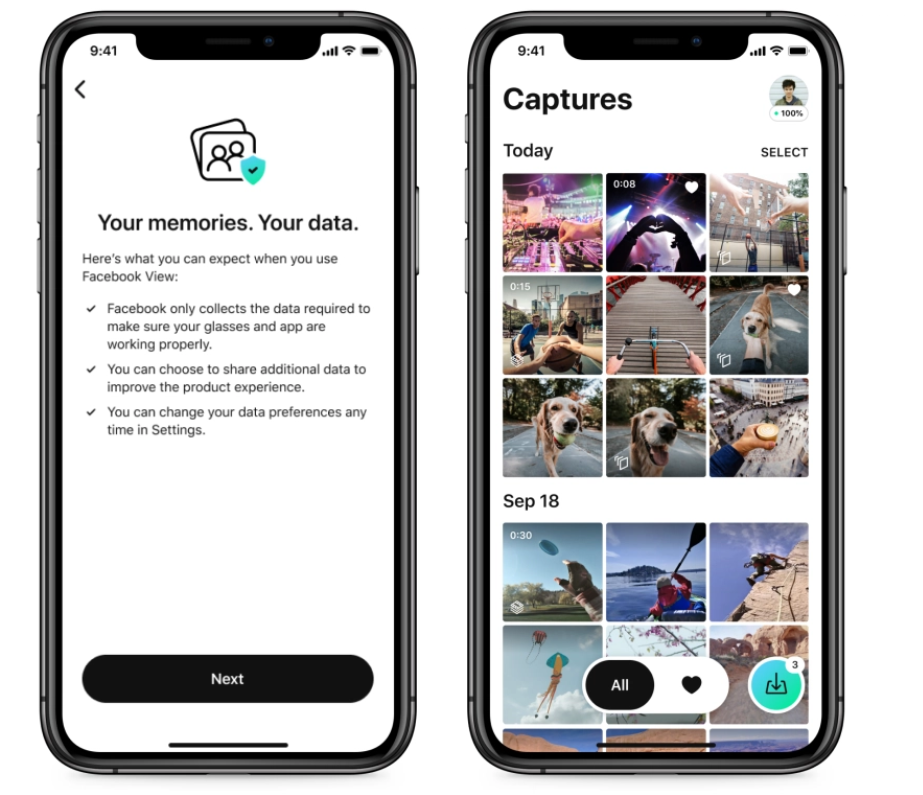
Ray-Ban Stories: Neat or nefarious?

Facebook’s launch of Ray-Ban Stories, smart glasses that capture photos and video to allegedly allow you to stay more present, is another layer of the company’s strategy to capture more of your memories.
It’s hard not to be cynical about the Facebook and Ray Ban (owned by EssilorLuxottica) partnership. My initial reaction to these $299 smart glasses went like this:
- Here’s what happens when an almost monopolist (Facebook) pairs up with a monopoly EssilorLuxottica.
- Can’t wait to see someone get punched for filming something they shouldn’t.
- Also, can’t wait to see how these specs go over in gym locker rooms.
- Is this really Snapchat envy?
- They are better than Google Glass, but the “glasshole” reputation will remain.
Facebook/Ray-Ban Stories smartglasses: Everything you need to know
But let’s shelve the quips about the Facebook-Ray-Ban collaboration and focus on the big picture. That big picture revolves around being a platform for collecting memories. Simply put, Facebook is building out its stack with smart glasses, which could be a viable endpoint much like the smartphone, to create a platform that holds your memories.


At Facebook you are the product. At Facebook your memories and content are the secret sauce. Your data is Facebook’s competitive advantage.
Consider the product phases.
Phase 1: Build out the memory collection database and platform. Facebook and Instagram are wrapped around the concept of connections with family and friends, but in the end, both properties are repositories for your photos, videos, and thoughts. Anyone who gets a reminder about a memory from seven years ago knows how Facebook can take you back in time. My bet is that we’ll ultimately relive these memories as we drool and take in our dopamine hit in some world created by Facebook.
Phase 2: Create an environment (think metaverse) and endpoints to deliver these memories, which will be sticky enough to monetize you for life. Does anyone really think Oculus is about gaming, virtual reality, and new ways of communicating? Perhaps a few. My theory is that Oculus is really about improving the technology that will keep you away from the present. The technology will improve to the point where we’ll be able to relive the good past memories via Oculus forever. Memories will be transferred via an easy API connection to the Oculus headset from Facebook. To get the gist, check out this short story about the Relive Box from the New Yorker.
Phase 3 (or really 2a): Create your own endpoint and ecosystem so you can control your destiny. Facebook doesn’t own the smartphone operating system or platform and needs a device like smart glasses to break free from rivals that own the mobile ecosystems. Google has Android and Apple has iOS. Microsoft has Windows if you want to go to laptops. Either way, Facebook can be at the mercy of Apple (and arguably is). Mark Zuckerberg can’t be too happy about being at the mercy of rival tech giants. Amazon has its own stack that revolves around Alexa, e-commerce and a smart home ecosystem.
We’re somewhere between phases two and three of Facebook’s memory stack build out. Should enough folks buy Ray-Ban Stories Facebook will find its endpoint. The smart glasses from Ray-Ban/Facebook are way more stylish than anything created before. Perhaps Ray-Ban Stories influences Oculus design in the future.
If Facebook becomes a smart glasses player, it can bypass smartphones and create a direct connection from its social network to your memories. If Facebook doesn’t become this memory platform perhaps it becomes the next AOL.
Now Facebook isn’t different than any other big tech player. They all are working the well-worn platform playbook. Own the platform and you win. Google, Apple and Amazon are all playing similar games. The difference is that Google, Apple and Amazon all offer more value in exchange for your data.
What Facebook has is your memories and content documenting them. Facebook’s foray into smart glasses is about capturing more of that content in a more intimate way. Bottom line: Facebook has a lot of your memories already and is looking to capture a lot more.



